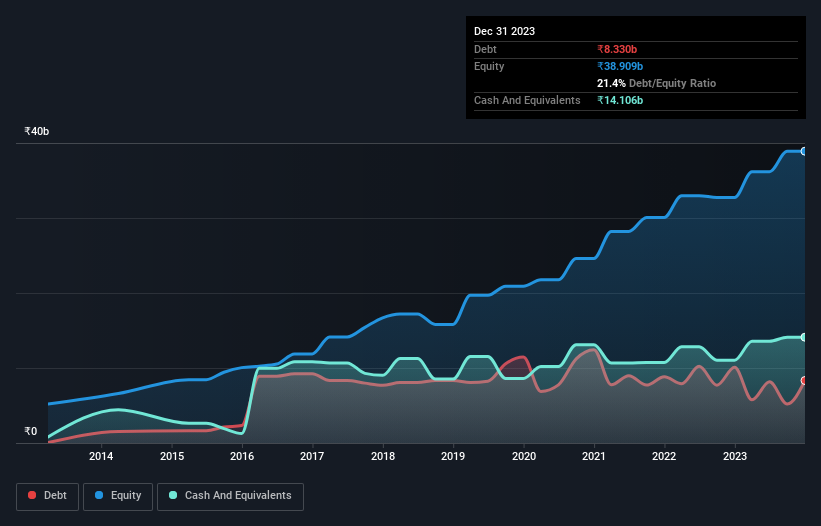- India
- /
- Life Sciences
- /
- NSEI:SYNGENE
These 4 Measures Indicate That Syngene International (NSE:SYNGENE) Is Using Debt Safely

Howard Marks put it nicely when he said that, rather than worrying about share price volatility, 'The possibility of permanent loss is the risk I worry about... and every practical investor I know worries about.' When we think about how risky a company is, we always like to look at its use of debt, since debt overload can lead to ruin. As with many other companies Syngene International Limited (NSE:SYNGENE) makes use of debt. But the more important question is: how much risk is that debt creating?
When Is Debt Dangerous?
Debt assists a business until the business has trouble paying it off, either with new capital or with free cash flow. In the worst case scenario, a company can go bankrupt if it cannot pay its creditors. However, a more common (but still painful) scenario is that it has to raise new equity capital at a low price, thus permanently diluting shareholders. Of course, plenty of companies use debt to fund growth, without any negative consequences. The first step when considering a company's debt levels is to consider its cash and debt together.
See our latest analysis for Syngene International
What Is Syngene International's Net Debt?
The image below, which you can click on for greater detail, shows that Syngene International had debt of ₹8.33b at the end of September 2023, a reduction from ₹10.1b over a year. But on the other hand it also has ₹14.1b in cash, leading to a ₹5.78b net cash position.

How Healthy Is Syngene International's Balance Sheet?
According to the last reported balance sheet, Syngene International had liabilities of ₹12.3b due within 12 months, and liabilities of ₹7.29b due beyond 12 months. On the other hand, it had cash of ₹14.1b and ₹5.17b worth of receivables due within a year. So these liquid assets roughly match the total liabilities.
Having regard to Syngene International's size, it seems that its liquid assets are well balanced with its total liabilities. So it's very unlikely that the ₹282.8b company is short on cash, but still worth keeping an eye on the balance sheet. Despite its noteworthy liabilities, Syngene International boasts net cash, so it's fair to say it does not have a heavy debt load!
And we also note warmly that Syngene International grew its EBIT by 20% last year, making its debt load easier to handle. The balance sheet is clearly the area to focus on when you are analysing debt. But ultimately the future profitability of the business will decide if Syngene International can strengthen its balance sheet over time. So if you're focused on the future you can check out this free report showing analyst profit forecasts.
Finally, a business needs free cash flow to pay off debt; accounting profits just don't cut it. Syngene International may have net cash on the balance sheet, but it is still interesting to look at how well the business converts its earnings before interest and tax (EBIT) to free cash flow, because that will influence both its need for, and its capacity to manage debt. Over the most recent three years, Syngene International recorded free cash flow worth 51% of its EBIT, which is around normal, given free cash flow excludes interest and tax. This cold hard cash means it can reduce its debt when it wants to.
Summing Up
We could understand if investors are concerned about Syngene International's liabilities, but we can be reassured by the fact it has has net cash of ₹5.78b. And it impressed us with its EBIT growth of 20% over the last year. So we don't think Syngene International's use of debt is risky. We'd be very excited to see if Syngene International insiders have been snapping up shares. If you are too, then click on this link right now to take a (free) peek at our list of reported insider transactions.
When all is said and done, sometimes its easier to focus on companies that don't even need debt. Readers can access a list of growth stocks with zero net debt 100% free, right now.
If you're looking to trade Syngene International, open an account with the lowest-cost platform trusted by professionals, Interactive Brokers.
With clients in over 200 countries and territories, and access to 160 markets, IBKR lets you trade stocks, options, futures, forex, bonds and funds from a single integrated account.
Enjoy no hidden fees, no account minimums, and FX conversion rates as low as 0.03%, far better than what most brokers offer.
Sponsored ContentNew: Manage All Your Stock Portfolios in One Place
We've created the ultimate portfolio companion for stock investors, and it's free.
• Connect an unlimited number of Portfolios and see your total in one currency
• Be alerted to new Warning Signs or Risks via email or mobile
• Track the Fair Value of your stocks
Have feedback on this article? Concerned about the content? Get in touch with us directly. Alternatively, email editorial-team (at) simplywallst.com.
This article by Simply Wall St is general in nature. We provide commentary based on historical data and analyst forecasts only using an unbiased methodology and our articles are not intended to be financial advice. It does not constitute a recommendation to buy or sell any stock, and does not take account of your objectives, or your financial situation. We aim to bring you long-term focused analysis driven by fundamental data. Note that our analysis may not factor in the latest price-sensitive company announcements or qualitative material. Simply Wall St has no position in any stocks mentioned.
About NSEI:SYNGENE
Syngene International
A contract research and manufacturing company, provides drug discovery and development services in India, the United States of America, Europe, and internationally.
Flawless balance sheet with moderate growth potential.
Market Insights
Community Narratives



